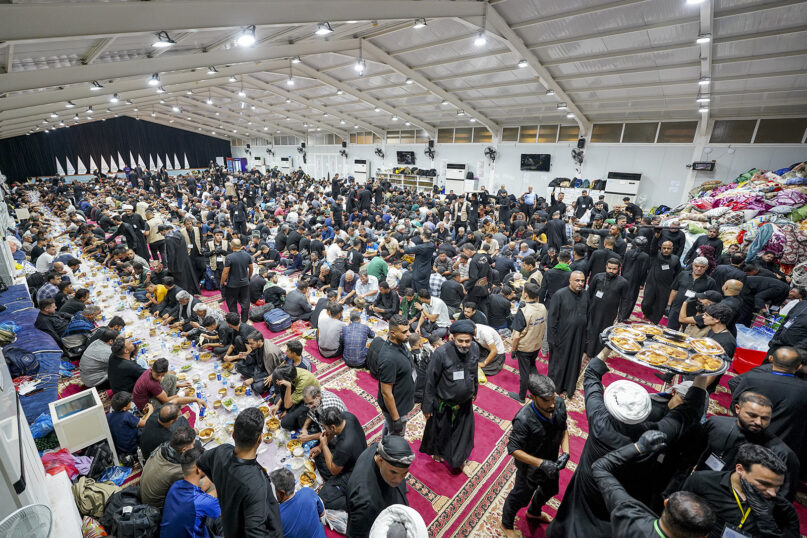(RNS) — Commemorating a month of tragedy and mourning is not the way my thrill-seeking almost-6-year-old child typically envisions spending her holidays.
The Islamic months of Muharram and Safar are marked by two key days of commemoration for many Muslims worldwide: Ashura and Arbaeen. On Ashura, the 10th day of Muharram, observed July 4 to 5 this year, Husayn, the grandson of Prophet Muhammad, was martyred in the battle of Karbala alongside his family and close companions in their stand against a tyrannical regime. Arbaeen, which means 40 in Arabic, is commemorated 40 days later — this year from Aug. 14 to 15. The mourning period typically continues until the end of Safar, marked by the death anniversary of the Prophet Muhammad, which falls on Aug. 23 this year.
On our summer bucket list, my daughter and I had planned to do all the typical fun things we can in the limited months of warmth we get in Canada, from splash pads and the beach to barbecues and amusement parks. This year, Arbaeen fell in the midst of a heat wave in Toronto. Turning a lemonade stand into a commemoration and charitable initiative was not part of the plan, but it turned out to be the most important highlight of our summer.
The idea began with a neighborhood mom friend, who, like me, was brainstorming ways to occupy her two young girls this summer. We texted back and forth late into the night after the kids were asleep, and I was immediately attracted to her idea of a lemonade stand — an innocent, screen-free way to enjoy the warmth, learn skills and socialize with friends.
But holding a lemonade stand simply for the sake of occupying our kids didn’t feel like enough in the world that we live in today, as we witness one Palestinian child after another being killed by starvation as a result of Israel’s intentional withholding of humanitarian aid. How could we preserve the sanctity of these months of religious observance with the innocence of childhood summer and with the grief of witnessing children being deprived of basic human rights across the world?
The answer came as I witnessed the annual Arbaeen walk.

Followers of cleric Muqtada al-Sadr distribute food to pilgrims heading to the holy city of Karbala for the annual Arbaeen pilgrimage, in Najaf, Iraq, Thursday, Aug. 7, 2025. (AP Photo/Anmar Khalil)
Every year, millions of people walk more than 45 miles from the Iraqi cities of Najaf to Karbala in what has come to be known as one of the world’s largest annual peaceful gatherings. Although primarily attracting Shia Muslims, the walk has garnered the attention and admiration of people of all faith backgrounds, from Sikhs to Christians. The Arbaeen pilgrimage consistently heralds over 21 million people from across the globe.
The walk is most famous for the generosity shown toward pilgrims. Groups set up hundreds of mawkibs, or service stations, along the walk, where walkers can find free food, cold drinks, tea, massages, medicines and resting lodges.
It dawned on me that a lemonade stand would be the perfect opportunity to bring the essence of Arbaeen to life here in Toronto, not only in the way that it would imitate the mawkibs of Iraq, but also in the message it would impart in upholding justice — the roots through which this commemoration has grown over the centuries.
We chose a banner that read “Sabeel of Sakinah” accompanied by an image of a bright yellow lemon. Sabeel is the Arabic word for a public water fountain, a source of generosity from which all can benefit. Sakinah is the 4-year-old daughter of Husayn, the great-granddaughter of Prophet Muhammad, who was taken as a prisoner following Ashura and died from abuse and grief in a prison in Syria.
We set up on a picnic bench at the playground where my daughter meets her friends every evening after dinner, in a neighborhood with a beautiful merging of races and religions. It was symbolic to have our stand at the playground, not only as we remembered Sakinah and told her story to passersby, but also as we remembered the children of Palestine who have been robbed of opportunities to play as they continue to survive through incessant trauma and grief, which has been coined chronic traumatic stress disorder.
It didn’t take long for children and parents to gather around as we distributed over 150 freeze pops, juice boxes and cups of cold lemonade for free and collected donations for families in Palestine. We also distributed flyers reminding our visitors that no child should go hungry or thirsty, and that living with safety, health and joy is every child’s right. Parents were thankful for our efforts and informed their friends so we were able to attract more people to the stand.
It is the legacy of Sakinah that reminds us to stand up for children’s rights everywhere. Through our message and the generosity of a remarkably receptive and conscious community, we raised over $600 to donate for food and formula for Palestinian children. What began as a simple lemonade stand turned into a stand for childhood.
It was important for us to bring the message of Arbaeen onto the streets — or rather, onto the playground — halfway across the world, especially in the context of the genocide of the Palestinians. That’s because Arbaeen is not just a religious event, but a call for justice for all of humanity.
(Zehra Kamani is a Toronto-based freelance writer with a background in research. Her website is zehrakamani.com. The views expressed in this commentary do not necessarily reflect those of Religion News Service.)





